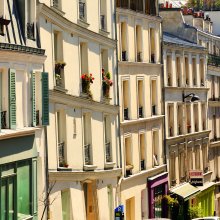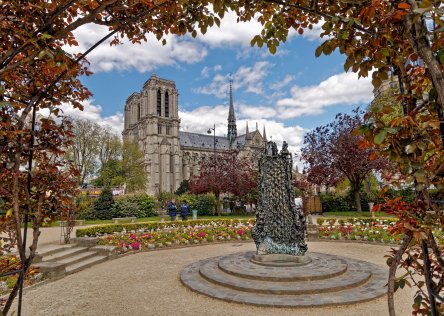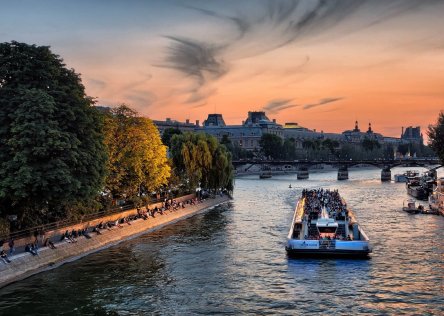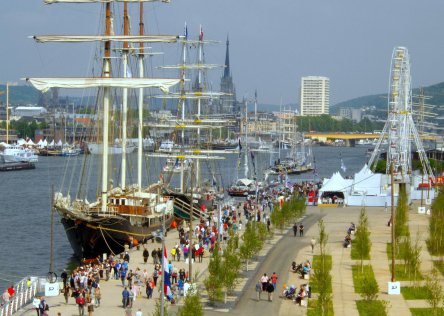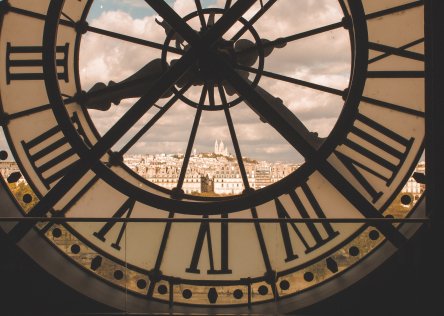As I write this post, I join the rest of France and millions of people around the world who remain in shock following the fire that started on April 15th, 2019. For us, Notre Dame is more than a landmark and a place of worship. It is a work of art that has born witness to our history for the greater part of the last millennium. It is a symbol of human accomplishment and endurance across many generations.
“It’s the very soul of Paris, but it’s not just for French people. For all humanity, it’s one of the great monuments to the best of civilisation,” said Barbara Drake Boehm, senior curator at the Metropolitan Museum of Art’s medieval Cloisters branch in New York. The traumatic impact of this devastating event transcends all cultural and religious boundaries. It will be felt across the globe by people of all faiths and none.

Notre Dame de Paris during the fire - ©Photo: Milliped
A witness to European history
'Great edifices, like great mountains, are the work of centuries,' wrote Victor Hugo in his literary masterpiece, The Hunchback of Notre Dame. This great and emblematic building has stood on the Ile de la Cité in Paris for more than 850 years. Some might say it is the embodiment of France itself, ever present at key moments in European history. Notre Dame hosted the marriages of French, English and Scottish kings and queens, and of the Emperor Napoleon. It was immortalized in one of the great works of French literature.
It survived the harrowing events of the French Revolution and two world wars. Against this context, the idea that a fire could destroy such a large part of Notre Dame in the space of a few hours would be hard to believe if we hadn't seen it on the news or from the streets of Paris with our own eyes.

Victor Hugo, author of The Hunchback of Notre Dame - ©Photo: Étienne Carjat
The cathedral was undergoing renovation work before the fire began. Cracks had started to appear in the stone, possibly caused by years of pollution, and there were concerns that the structure would soon become unstable. There was speculation that this accidental fire may have been related in some way to this renovation work.
What remains of the cathedral?
Apart from one firefighter who was injured during the battle to control the fire, there were fortunately no other human casualties.
In terms of the structure and the relics and artwork contained therein, we have been encouraged by reports of how much firefighters and others were able to rescue from the fire. This is what we know so far:
Destroyed
The cathedral’s iconic 19th century spire collapsed quite early on and almost the entire roof has been destroyed. We also know that a fragment of the Holy Crown of Thorns (the main relic was rescued - see below), a relic of St Denis, and a relic of St Geneviève did not survive the fire.
Saved
The firefighters of Paris worked strategically through the night to protect the other parts of structure, including the two towers, which were saved. With additional help from Jean-Marc Fournier, the chaplain of the Paris fire brigade who joined a human chain to enter the burning building, agents of the culture ministry, the archbishop’s staff, and the security services some of the important artwork and holy relics that were inside the cathedral were also saved.

The two iconic towers of Notre Dame de Paris were saved from destruction - ©Sarah Sergent - Paris Tourist Office
On the night of the fire, the Mayor of Paris, Anne Hidalgo, confirmed that one of Notre Dame’s most precious relics, the Holy Crown of Thorns, had been saved. Originally from Jerusalem, it is said that this ring of rushes and thorns formed part of the crown of thorns that was placed on Jesus’s head during his crucifixion. King Louis IX received it in 1238 and built Paris’s beautiful Sainte-Chappelle to house it. It was later moved to Notre Dame de Paris and is now encased in rock crystal to protect it.
The mayor has also confirmed that the Tunic of Saint Louis has been saved. This 13th century garment belonged to King Louis IX – the same king to have acquired the Holy Crown of Thorns and the only French king to be canonized. Following his coronation in 1226, King Louis participated in the Seventh Crusade, eventually perishing in 1270, during the Eighth Crusade. He was made a saint in 1297.
According to a cathedral spokesman, all three magnificent Rose Windows, dating back to the 13th century, have survived the fire. They will, however, need to be closely inspected by experts for hidden damage.

The North Rose Window at Notre Dame de Paris
French media are currently reporting that the True Cross and Holy Nails – claimed to be a fragment of the cross from the crucifixion and one of the original nails – have survived the fire.
Notre Dame’s principal organist, Vincent Dubois, has said that the 8,000-pipe great organ, first built in 1403, was not burned in the fire. However, it is not yet clear whether it can still be played in its present state, as it may have suffered water damage. In that case, it will require restoration. Along with the cathedral, the organ has been updated over the centuries, its most recent restoration work being carried out in 2013. Some of the medieval organ pipes are the originals.

Organ of Notre Dame de Paris, before the fire
Unknown
Reports suggest that the sculpture by Nicolas Coustou on the high altar, ‘Descent from the Cross’, is still standing, but its condition is currently unknown. Finally, we are still waiting to hear about the iconic 14th century statue, ‘Madonna and Child’ (also known as ‘Notre Dame de Paris’ – Our Lady of Paris); the 18th century Statue of Saint Denis by Nicolas Coustou, depicting the patron saint of Paris; a 17th century painting of St Thomas Aquinas, depicting the saint drinking from a fountain of wisdom with the people; and the cathedral’s ten bells, the oldest of which dates back to the 15th century and was recast in 1681. We will update this post when we have more information.
Notre Dame de Paris will rise again
Although many things remain unknown at this stage, one thing of which we are certain is that Notre Dame de Paris remains a pillar of resilience, and will rise again from the ashes. When Victor Hugo wrote The Hunchback of Notre Dame, the cathedral was in a dreadful state of neglect and disrepair. So much so, that at the beginning of his novel, Hugo predicted that 'the church will perhaps soon disappear from the face of the earth.' The novel was a wake-up call to the people, who once again turned their attention toward the cathedral and demanded its restoration. Hugo’s novel was written as a tribute to Notre Dame, in anticipation of its imminent demise. Instead, it immortalized the cathedral and succeeded in saving it from total ruin.
Last night, the people turned their attention toward Notre Dame once again, as its survival hung by a thread. The sight of the collapsing spire was painful for many of us. But we know that this was not its first spire to have succumbed to the power of nature, and to have later been recreated. The original 13th century spire of Notre Dame was in such a state of deterioration that it was pulled down at the end of the 18th century. The second and recently collapsed spire was recreated under the supervision of architect Eugène Viollet-le-Duc in the mid 19th century.

Notre Dame de Paris in the 1860s, after the reconstruction of the second spire
History is therefore a comforting reminder to us all that Notre Dame de Paris has been rebuilt and restored before - and will be once again. French billionaires François-Henri Pinault and Bernard Arnault have already pledged a total of 300 million euros to help rebuild the cathedral. UNESCO has also pledged its support to help safeguard and restore the cathedral, which forms part of the UNESCO world heritage site, ‘Paris, banks of the Seine’. But small donations are what will make the most of the renovation costs. If, like us, you wish to give some, you may go to this website to donate for Notre Dame de Paris.
Though we are still shocked and devastated today, France and Notre Dame will survive this tragedy, as it has survived so much else over history. We also hope it will bring us closer as a nation, during what have been challenging times for the country. In spite of our political, cultural and social differences, it is our shared world heritage that unites us all.
UPDATE: Read our latest post about the restoration of Notre Dame




